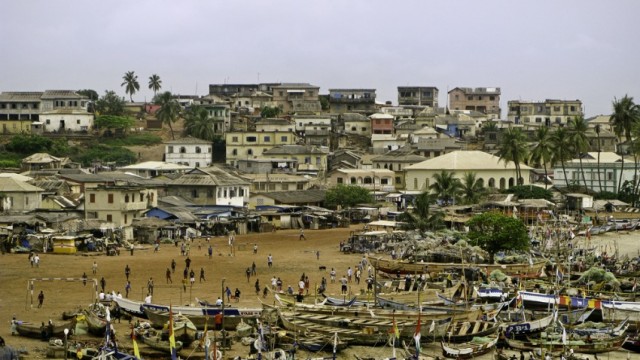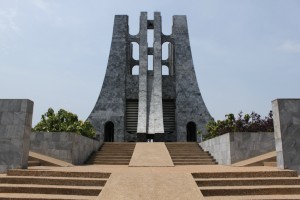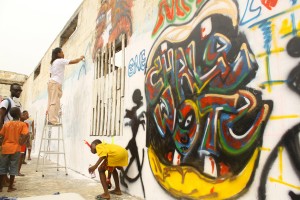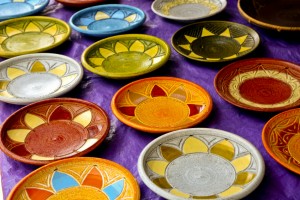Accra may have a great range of shops and restaurants and fantastic, music-loving nightlife, but few visitors fall in love with it at first sight. Initially it can be hard to look past the congested roads, confusing public transport and lack of green zones.
But hopefully this Accra city guide will inspire you to look beyond the forest and see the trees, as it were. As you navigate the tro-tros and heat and chaos that envelops the streets, eventually things will click and Accra’s sense of energy and fluidity will quickly get under your skin. You’ll discover the thrilling, beating heart of the city in its monuments, malls, markets and beaches.
More importantly, you’ll discover that life in Accra is lived in public spaces. Along almost every bustling street people are trading, gossiping, flirting, cooking and dining in the open air.
History and culture
Sights are not Accra’s strong point, but there are some places worth ticking off. First is the Nkrumah Mausoleum, a striking marble monument set in peaceful grounds. The small museum’s spellbinding collection of photos shows the father of modern Ghana in his prime.
A short walk east brings you to Independence Arch and Black Star Square, which commemorate the independence Nkrumah fought so hard to win. You can walk around quite freely when the area is not in use, and the former jumpiness about photography seems to have relaxed in recent years.
Delve further into Ghana’s history at the National Museum, a distinctive modernist dome designed by the British architect Denys Lasdun. It’s small, but there is a good collection of old stools and currency, and a gorgeous example of Ashanti kente cloth that is over a century old.
The pick of the city’s modern cultural attractions is Artists Alliance, a free three-story gallery founded by Ghanaian painter Ablade Glover. Also worth a look is the Nubuke Foundation’s art and education centre in East Legon, with two small galleries, a cafe and a shop.
Finally, make time for a walk around Jamestown and Usshertown — collectively known as ‘Old Accra’ — where a few colonial-era buildings still survive, notably the lighthouse, the General Post Office, Ussher Fort and Fort James. Once a year the Chale Wote Festival turns the area into a huge street party devoted to art, music, dance and drama. It’s a lively, safe way for visitors to explore a fascinating but deprived neighborhood.
Shopping
For a taste of Ghana’s markets, head to the mother of them all: the vast Makola, covering several blocks in central Accra. You’ll get far better deals on cloth here than at top-end retailers like Woodin and Vlisco, although the prints may not be as cutting-edge. Anything else you could possibly want is here too, piled up into every spare inch of space. It can be a confusing, breathless environment — if you can find someone to guide you, so much the better, but if not the worst that will happen is that you’ll get a bit lost. Since it is a serious working market — the beating heart of southern Ghana’s informal economy, in fact — visitors rarely experience much hassle.
If for any reason you crave Western-style shopping, there are several malls. Accra Mall has the best variety (and offers the above-mentioned Woodin and Vlisco outlets for fabric-heads), while Marina is slightly more upmarket and East Legon’s A&C Square has a more relaxed outdoor environment. A titanic new mall, West Hills, is under construction in the city’s western suburbs.
When it comes to souvenirs and crafts, you have two options: haggle hard at the Centre for National Culture, which has a phenomenal range matched by phenomenal levels of hassle; or pay more at relaxed boutiques like AACD African Market and Wild Gecko. The latter in particular has a fantastic range of design-conscious new pieces and Ghanaian antiques, but the prices can be eye-watering. Remember you’ll often get better deals on crafts outside the city, so if you’re planning on travelling round the country and don’t mind lugging back a stool, drum or whatever else takes your fancy, you’ll save a few cedis.
Going out
The range of food available often comes as a surprise to new visitors, but bear in mind that Accra has a huge cohort of expats, and that many wealthy Ghanaians have very international tastes. There are also long-standing immigrant communities, most noticeably Lebanese, who are heavily involved in the food, retail and catering businesses – if you’re a demon for fattoush and shawarma, head to the wonderful Le Bouquet on Labadi Road.
Unless you have a specific destination in mind, head to Osu, where Oxford Street and its side roads are thronged with chop bars and roadside spots as well as Western-style restaurants and style bars. Republic on Third Lane is a reliable choice, with regular live music and DJs and a food and drink menu packed with modern twists on Ghanaian classics.
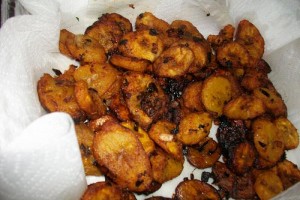
Kelewele (Courtesy of Travel-studies.com)
A little way south of Oxford Street you’ll find Osu Night Market, a lantern-lit treasure trove for street food lovers. Fill up on kenkey and fish, roast pork with pepper sauce, fried shrimp and and deep-fried spiced plantain (kelewele). If you’d prefer a more sedate introduction to Ghanaian food, try restaurant-style outlets like Country Kitchen, Buka and Maquis Tante Marie.
Finally, if you can stand the prices, a visit to Santoku will give you a glimpse of Accra’s wealthier side. This stylish modern Japanese restaurant has links to the Nobu chain, and would easily pass muster in New York or London.
Families and fun
Accra’s activities aren’t always well advertised. Case in point: few visitors seem aware that the city has a bowling alley, possibly because it is hidden in a boxy yellow building on the road to Teshie. Run by a friendly Chinese family, it is reasonably cheap and efficient, and has frames to help little ones get their share of strikes.
In Dzorwulu — virtually at the opposite end of town — you’ll find Marvels, a well-kept mini-golf course with a pleasant cafe.
The most central beach is La Pleasure Beach, which should be thought of as a party spot rather than a place to relax. It’s a riotous mix of bars, soundsystems, free-form soccer matches, acrobatic displays and horses for hire (yes, horses). There’s a bit of hassle from street sellers, but nothing aggressive.
At Accra Mall you’ll find a multi-screen cinema that plays reasonably up-to-date blockbusters as well as Ghanaian and Nigerian fare. If your tastes are more eclectic, keep an eye on the Alliance Francaise and Goethe Institute events programs, which often feature short films, and on the annual Environmental Film Festival, which takes place across several venues in June-July.
Getting around
Public transport is confusing to newcomers because the city runs on social interactions rather than timetables and maps — you’ll rarely find yourself short of help when trying to navigate a tro-tro (shared minibus taxi) station.
Tro-tros are unbelievably cheap, but there are no maps or route numbers, so you’ll need to ask someone. You can usually tell a car’s final destination by the cries and hand signals of the ‘mate’ (conductor): a circular motion and ‘circle, circle, circle’ means Nkrumah Circle, while an upwards pointing motion and ‘Accra, Accra, Accra’ means the main bus station near Makola Market.
Although haggling can be a chore, taxis are cheap and easy to find. Remember that only the biggest streets are recognized by name, so decide on a landmark near your destination before you travel. Luckily Oxford Street, the city’s biggest nightlife draw, is familiar to every driver.
There’s even a positive twist to Accra’s congestion: since it is largely commuter and commercial traffic, on a Sunday the roads are all but deserted, and getting anywhere becomes a breeze.
